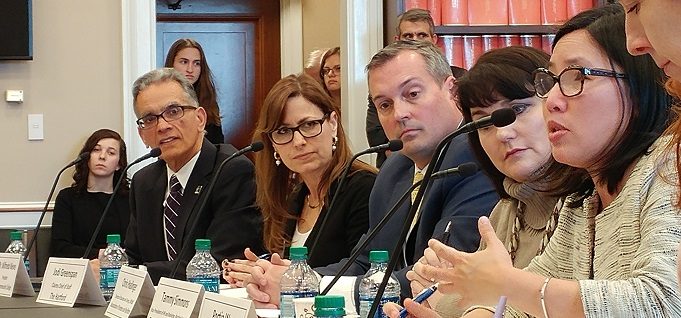Tapping apprenticeships to address the skills gap
By Tabitha Whissemore
January 24, 2018
Legislators heard about the power of apprenticeships to turn lives — and businesses — around.
In June 2017, Connecticut’s Capital Community College (CCC) launched a new apprenticeship program — one focused on insurance.
CCC partnered with insurance corporation The Hartford on the Insurance Claims Operations Registered Apprenticeship, a one-year program that allows apprentices to earn $15 an hour while gaining on-the-job training. They also participate in insurance-related instruction, mentoring and academic coaching.
Students who successfully complete the program will transition into a full-time job. In addition, they earn an associate degree, a non-credit certificate in insurance claims operations, 12 college credits, a state adjuster’s license and the Connecticut Department of Labor Registered Apprenticeship certificate.
It’s not your typical program when it comes to apprenticeship, but it’s exactly the kind that congressional leaders want to learn about. And their interest was piqued when CCC President Wilfredo Nieves outlined the program during a panel discussion January 18 on best practices in apprenticeships that was organized by organized by House Democrats.
Rep. Rosa DeLauro (D-Connecticut), who convened the event, touted apprenticeships for their ability to tackle one of the most critical issues today: bridging the skills gap. She said it’s time to “shift our thinking,” to not only focus on degrees, but on in-demand skills. Not having a degree shouldn’t disqualify someone from having economic security, DeLauro said.
Nieves’ testimony echoed DeLauro’s sentiments.
“The apprenticeship model changes students’ lives by giving them opportunities to enter good jobs and receive academic, mentoring and financial support to complete their college degrees,” Nieves said.
Nieves, the only community college representative on the panel, was joined by The Hartford’s Jodi Greenspan. The apprenticeship program came about in part because The Hartford was seeking new “diverse, talented employees,” and “we had untapped potential student workers at community colleges near our office locations,” Greenspan said.
The Hartford is the first U.S. insurance company to have a Registered Apprenticeship with the federal government, according to Greenspan. The program has expanded to Arizona, and may continue in Florida. And success has spurred CCC to launch two new apprenticeship programs in 2018: food service and hospitality management and financial services cyber security.
A missed opportunity
At Aon, a provider of risk-management services, hiring requirements had disqualified students from City Colleges of Chicago, and that was “a missed opportunity for us,” said Bridget Gainer, vice president of global public affairs.
“We were ignoring an entire talent pipeline that was literally staring us in the face,” Gainer said.
Aon looked at its entry-level positions and evaluated which ones truly required a four-year college degree and which required it “because that was what we’d always done,” Gainer said. Many of those positions had high attrition because “people didn’t need the degree, so they were not staying in a job that didn’t really demand it,” she said.
The company partnered with Harold Washington College to create an apprenticeship program that would reduce turnover, increase job satisfaction and help the community. Aon has two-year tracks in information technology, human resources and its core insurance business.
Other companies, such as Accenture and Walgreens, have joined with Aon to scale up the program. The goal is to have as many as 500 or 1,000 apprentices in 2019.
Raising the profile
Microsoft is making use of apprentices to ensure people have the right skills for evolving technology jobs. The company has a registered apprenticeship partnership program with Apprenti, part of the Washington Technology Industry Association. The Apprenti program “is a pipeline for under-represented groups to gain training, certification and placement within the tech industry,” explained Portia Wu, Microsoft’s director of workforce policy.
Microsoft has made more use of apprenticeships in Europe, and Wu pointed to the UK model as an interesting example of public-private partnership. Private companies play a part in developing government-recognized standards. The government provides funding to support apprenticeships.
“Standardization, consistent public support, and a broad business understanding of apprenticeship’s return on investment are critical components of that success,” Wu said.
But while apprenticeship programs are standard in Europe, they’re harder to find in the United States. Increasing access to programs is a “key challenge,” Wu noted.
She joked that she can easily find five tacquerias close to her with an internet search, but can’t find apprenticeships that way. That’s a big negative in an age where people are used to getting immediate information.
“Particularly outside the union context, there is no clear, transparent marketplace or centralized hub where individuals can find, learn about and even rate registered apprenticeships,” she said.
She suggested that listing available apprenticeships in one location and making it easier to apply would help “expand the breadth” of jobseekers looking to learn about apprenticeship opportunities, as well as help employers by expanding the pool of candidates.
There’s more to the story! Read the full article at CC Daily.


